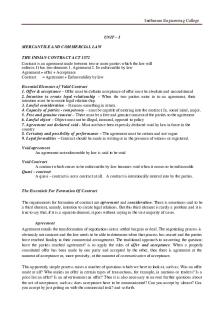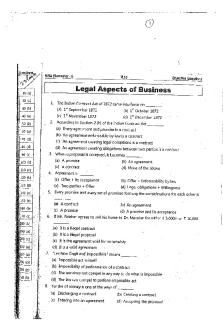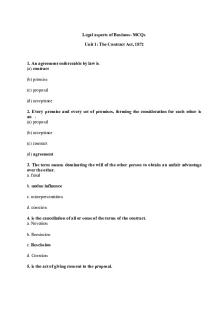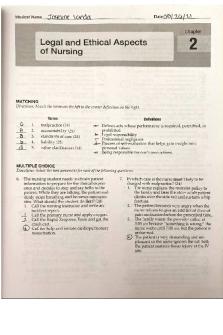BA9207 Legal Aspects of Business notes PDF

| Title | BA9207 Legal Aspects of Business notes |
|---|---|
| Author | M TILAK SURYA |
| Course | masters in business administration |
| Institution | Anna University |
| Pages | 38 |
| File Size | 663.2 KB |
| File Type | |
| Total Downloads | 87 |
| Total Views | 166 |
Summary
SEMESTER-1...
Description
Sudharsan Engineering College
UNIT – I MERCANTILE AND COMMERCIAL LAW THE INDIAN CONTRACT ACT 1872 Contract is an agreement made between two or more parties which the law will enforce. It has two elements 1. Agreement 2. Its enforceable by law Agreement = offer + Acceptance Contract = Agreement + Enforceability by law Essential Elements of Valid Contract 1. Offer & acceptance – Offer must be definite acceptance of offer must be absolute and unconditional 2. Intention to create legal relationship – When the two parties enter in to an agreement, their intention must be to create legal relationship. 3. Lawful consideration – It means something in return. 4. Capacity of parties - competency – must be capable of entering into the contract. Ie, sound mind, major. 5. Free and genuine consent – There must be a free and genuine consent of the parties to the agreement 6. Lawful object – Object must not be illegal, immoral, opposed to policy 7. Agreement not declared void - Must not have been expressly declared void by law in force in the country 8. Certainty and possibility of performance – The agreement must be certain and not vague 9. Legal formalities – Contract should be made in writing or in the presence of witness or registered. Void agreement An agreement not enforceable by law is said to be void Void Contract A contract which ceases to be enforceable by law becomes void when it ceases to be enforceable Quasi – contract A quasi – contract is not a contract at all. A contract is intentionally entered into by the parties.
The Essentials For Formation Of Contract The requirements for formation of contract are agreement and consideration . There is sometimes said to be a third element, namely, intention to create legal relations. But this third element is rarely a problem and it is true to say that, if it is a separate element, it goes without saying in the vast majority of cases. Agreement Agreement entails the transformation of negotiations into a settled bargain or deal. The negotiating process is obviously not contract and the law needs to be able to determine when that process has ceased and the parties have reached finality in their commercial arrangement. The traditional approach to answering the question: have the parties reached agreement? is to apply the rules of offer and acceptance. When a properly constituted offer has been made by one party and accepted by the other, then there is agreement at the moment of acceptance or, more precisely, at the moment of communication of acceptance. This apparently simple process raises a number of questions which we have to look at, such as: Was an offer made at all? Who makes an offer in certain types of transactions, for example, in auctions or tenders? Is a price list an offer? Is an advertisement an offer? Then it is also necessary to answer further questions about the act of acceptance, such as: does acceptance have to be communicated? Can you accept by silence? Can you accept by just getting on with the commercial task? and so forth.
Sudharsan Engineering College Consideration We have already seen that consideration involves a notion of exchange. There are rules about what constitutes an exchange and what might be exchanged in order to amount to a good consideration. We will look at these rules after we have examined the requirements of offer and acceptance. The relationship between the rules of offer and acceptance on the one hand and the rules of consideration on the other hand is that the exchange which constitutes an acceptance of an offer - in effect an exchange of promises is brought about by acceptance - is at the same time the necessary exchange which constitutes the consideration. All this will become clearer when we examine the doctrine of consideration in detail. Performance of contract Execution of a contract by which the contracting parties are automatically discharged of their obligations under it. Although contracts usually call for full and precise performance, a substantial performance may be acceptable under certain circumstances, on a pro rata basis, or on payment of damages for the unfinished or defective performance. Discharge of Contract – A contract may be discharged 1. By performance – Actual performance, Attempted performance 2. By agreement or consent – Express consent, Implied consent (novation,recission,alteration) 3. By impossibility of performance 4. By lapse of time 5. By operation of law – By death, By merger, By insolvency 6. By breach of contract – actual breach, anticipatory breach THE SALE OF GOODS ACT 1930
An Act to define and amend the law relating to the sale of goods 1. Short title, extent and commencement (1) This Act may be called the Sale of Goods Act, 1930. 2 It extends to the whole of India [except the State of Jammu and Kashmir].] (3) It shall come into force on the lst day of July, 1930. 2. Application of provisions of Act 9 of 1872 The unrepeated provisions of the Indian Contract Act, 1872, save insofar as they are inconsistent with the express provisions of this Act, shall continue to apply to contracts for the sale of goods. FORMATION OF THE CONTRACT OF SALE Sale and agreement to sell (1) A contract of sale of goods is a contract whereby the seller transfers or agrees to transfer the property in goods to the buyer for a price. There may be a contract of sale between one part-owner and another. (2) A contract of sale may be absolute or conditional. (3) Where under a contract of sale the property in the goods is transferred from the seller to the buyer, the contract is called a sale, but where the transfer of the property in the goods is to take place at a future time or subject to some condition thereafter to be fulfilled, the contract is called an agreement to sell.
Sudharsan Engineering College (4) An agreement to sell becomes a sale when when the time elapses or the conditions are fulfilled subject to which the property in the goods is to be transferred. FORMALITIES OF THE CONTRACT Contract of sale how made (1) A contract of sale is made by an offer to buy or sell goods for a price and the acceptance of such offer. The contract may provide for the immediate delivery of the goods or immediate payment of the price of both, or for the delivery or payment by instalments, or that the delivery or payment or both shall be postponed. (2) Subject to the provisions of any law for the time being in force, a contract of sale may be made in writing or by word of mouth, or partly in writing and partly by word of mouth or may be implied from the conduct of the parties. SUBJECT MATTER OF CONTRACT Existing or future goods (1) The goods which form the subject of a contract of sale may be either existing goods, owned or possessed by the seller, or future goods. (2) There may be a contract for the sale of goods the acquisition of which by the seller depends upon a contingency which may or may not happen. (3) Where by a contract of sale the seller purports to effect a present sale of future goods, the contract operates as an agreement to sell the goods. Goods perishing before making of contract Where there is a contract for the sale of specific goods, the contract is void if the goods without the knowledge of the seller have, at the time when the contract was made, perished or become so damaged as no longer to answer to their description in the contract. Goods perishing before sale but after agreement to sell Where there is an agreement to sell specific goods, and subsequently the goods without any fault on the part of the seller or buyer perish or become so damaged as no longer to answer to their description in the agreement before the risk passes to the buyer, the agreement is thereby avoided. THE PRICE Ascertainment of price (1) The price in a contract of sale may be fixed by the contract or may be left to be fixed in manner thereby agreed or may be determined by the course of dealing between the parties. (2) Where the price is not determined in accordance with the foregoing provisions, the buyer shall pay the seller a reasonable price. What is a reasonable price is a question of fact dependent on the circumstances of each particular case. Agreement to sell at valuation (1) Where there is an agreement to sell goods on the terms that the price is to be fixed by the valuation of a third party and such third party cannot or does not make such valuation, the agreement is thereby avoided;
Sudharsan Engineering College PROVIDED that, if the goods or any part thereof have been delivered to, and appropriated by, the buyer, he shall pay a reasonable price therefore. (2) Where such third party is prevented from making the valuation by the fault of the seller or buyer, the party not in fault may maintain a suit for damages against the party in fault. CONDITIONS AND W ARRANTIES Stipulations as to time Unless a different intention appears from the terms of the contract, stipulations as to time of payment are not deemed to be of the essence of a contract of sale. Whether any other stipulation as to time is of the essence of the contract or not depends on the terms of the contract. Condition and warranty (1) A stipulation in a contract of sale with reference to goods which are the subject thereof may be a condition or a warranty. (2) A condition is a stipulation essential to the main purpose of the contract, the breach of which gives rise to a right to treat the contract as repudiated. (3) A warranty is a stipulation collateral to the main purpose of the contract, the breach of which gives rise to a claim for damages but not to a right to reject the goods and treat the contract as repudiated. (4) Whether a stipulation in a contract of sale is a condition or a warranty depends in each case on the construction of the contract. A stipulation may be a condition, though called a warranty in the contract.
W hen condition to be treated as warranty (1) Where a contract of sale is subject to any condition to be fulfilled by the seller, the buyer may waive the condition or elect to treat the breach of the condition as a breach of warranty and not as a ground for treating the contract as repudiated. (2) Where a contract of sale is not severable and the buyer has accepted the goods or part thereof, 5[***] the breach of any condition to be fulfilled by the seller can only be treated as a breach of warranty and not as a ground for rejecting the goods and treating the contract as repudiated, unless there is a term of the contract, express or implied, to that effect. (3) Nothing in this section shall affect the case of any condition or warranty fulfilment of which is excused by law by reason of impossibility or otherwise. Implied undertaking as to title, etc. In a contract of sale, unless the circumstances of the contract are such as to show a different intention there is(a) an implied condition on the part of the seller that, in the case of a sale, he has a right to sell the goods and that, in the case of an agreement to sell, he will have a right to sell the goods at the time when the property is to pass; (b) an implied warranty that the buyer shall have and enjoy quiet possession of the goods;
Sudharsan Engineering College (c) an implied warranty that the goods shall be free from any charge or encumbrance in favour of any third party not declared or known to the buyer before or at the time when the contract is made. Sale by description Where there is a contract for the sale of goods by description, there is an implied condition that the goods shall correspond with the description; and, if the sale is by sample as well as by description, it is not sufficient that the bulk of the goods corresponds with the sample if the goods do not also correspond with the description. Implied conditions as to quality or fitness Subject to the provisions of this Act and of any other law for the time being in force, there is no implied warranty or condition as to the quality or fitness for any particular purpose of goods supplied under a contract of sale, except as follows:(1) Where the buyer, expressly or by implication, makes known to the seller the particular purpose for which the goods are required, so as to show that the buyer relies on the seller's skill or judgement, and the goods are of a description which it is in the course of the seller's business to supply (whether he is the manufacturer or producer or not), there is an implied condition that the goods shall be reasonably fit for such purpose: PROVIDED that, in the case of a contract for the sale of a specified article under its patent or other trade name, there is no implied condition as its fitness for any particular purpose. (2) Where goods are bought by description from a seller who deals in goods of that description (whether he is the manufacturer or producer or not), there is an implied condition that the goods shall be of merchantable quality; PROVIDED that, if the buyer has examined the goods, there shall be no implied condition as regards defects which such examination ought to have revealed. (3) An implied warranty or condition as to quality or fitness for a particular purpose may be annexed by the usage of trade. (4) An express warranty or condition does not negative a warranty or condition implied by this Act unless inconsistent therewith. Sale by sample (1) A contract of sale is a contract for sale by sample where there is a term in the contract, express or implied, to that effect. (2) In the case of a contract for sale by sample there is an implied condition(a) that the bulk shall correspond with the sample in quality; (b) that the buyer shall have a reasonable opportunity of comparing the bulk with the sample; (c) that the goods shall be free from any defect, rendering them unmerchantable, which would not be apparent on reasonable examination of the sample.
Sudharsan Engineering College EFFECTS OF THE CONTRACT TRANSFER OF PROPERTY AS BETW EEN SELLER AND BUYER Goods must be ascertained Where there is a contract for the sale of unascertained goods, no property in the goods is transferred to the buyer unless and until the goods are ascertained. Property passes when intended to pass (1) Where there is a contract for the sale of specific or ascertained goods the property in them is transferred to the buyer at such time as the parties to the contract intend it to be transferred. (2) For the purpose of ascertaining the intention of the parties regard shall be had to the terms of the contract, the conduct of the parties and the circumstances of the case. (3) Unless a different intention appears, the rules contained in sections 20 to 24 are rules for ascertaining the intention of the parties as to the time at which the property in the goods is to pass to the buyer. Specific goods in a deliverable state Where there is an unconditional contract for the sale of specific goods in a deliverable state, the property in the goods passes to the buyer when the contract is made, and it is immaterial whether the time of payment of the price or the time of delivery of the goods, or both, is postponed. Specific goods to be put into a deliverable state Where there is a contract for the sale of specific goods and the seller is bound to do something to the goods for the purpose of putting them into a deliverable state, the property does not pass until such thing is done and the buyer has notice thereof. Specific goods in a deliverable state, when the seller has to do anything thereto in order to ascertain price Where there is a contract for the sale of specific goods in a deliverable state, but the seller is bound to weigh, measure, test or do some other act or thing with reference to the goods for the purpose of ascertaining the price, the property does not pass until such act or thing is done and the buyer has notice thereof. Sale of unascertained goods and appropriation (1) Where there is a contract for the sale of unascertained or future goods by description and goods of that description and in a deliverable state are unconditionally appropriated to the contract, either by the seller with the assent of the buyer or by the buyer with the assent of the seller, the property in the goods thereupon passes to the buyer. Such assent may be expressed or implied, and may be given either before or after the appropriation is made. (2) Delivery to carrier-Where, in pursuance of the contract, the seller delivers the goods to the buyer or to a carrier or other bailee (whether named by the buyer or not) for the purpose of transmission to the buyer, and does not reserve the right of disposal, he is deemed to have unconditionally appropriated the goods to the contract. Goods sent on approval or "on sale or return" When goods are delivered to the buyer on approval or "on sale or return" or other similar terms, the property therein passes to the buyer-
Sudharsan Engineering College (a) when he signifies his approval or acceptance to the seller or does any other act adopting the transaction; (b) if he does not signify his approval or acceptance to the seller but retains the goods without giving notice of rejection, then, if a time has been fixed for the return of the goods, on the expiration of such time, and, if no time has been fixed, on the expiration of a reasonable time. Reservation of right of disposal (1) Where there is a contract for the sale of specific goods or where goods are subsequently appropriated to the contract, the seller may, by the terms of the contract or appropriation, reserve the right of disposal of the goods until certain conditions are fulfilled. In such case, notwithstanding the delivery of the goods to a buyer, or to a carrier or other bailee for the purpose of transmission to the buyer, the property in the goods does not pass to the buyer until the conditions imposed by the seller are fulfilled. 6[(2) Where goods are shipped or delivered to a railway administration for carriage by railway and by the bill of lading or railway receipt, as the case may be, the goods are deliverable to the order of the seller or his agent, the seller is prima facie deemed to reserve right of disposal. (3) Where the seller of goods draws on the buyer for the price and transmits to the buyer the bill of exchange together with the bill of lading or, as the case may be, the railway receipt, to secure acceptance or payment of the bill of exchange, the buyer is bound to return the bill of lading or the railway receipt if he does not honour the bill of exchange; and, if he wrongfully retains the bill lading or the railway receipt, the property in the goods does not pass to him. Explanation : In this section, the expressions "railway" and "railway administration" shall have the meanings respectively assigned to them under the Indian Railways Act, 1890.] Risk prima facie passes with property Unless otherwise agreed, the goods remain at the seller's risk until the property therein is transferred to the buyer, but when the property therein is transferred to the buyer, the goods are at the buyer's risk whether delivery has been made or not: PROVIDED that, where delivery has been delayed through the fault of either buyer or seller, the goods are at the risk of the party in fault as regards any loss which might not have occurred but for such fault: PROVIDED ALSO that nothing in this section shall affect the duties or liabilities of either seller or buyer as a bailee of the goods of the other party. TRANSFER OF TITLE Sale by person not the owner Subject to the provisions of this Act and of any other law for the time being in force, where goods are sold by a person who is not the owner thereof and who does not sell them under the authority or with the consent of the owner, the buyer acquires no better title to the goods than the seller had, unless the owner of the goods is by his conduct precluded from denying the seller's authority to sell: PROVIDED that, where a mercantile agent is, with the consent of the owner, in possession of the goods or of a document of title to the goods, any sale made by him, when acting in the ordinary course of business of a mercantile agent, shall be as valid as if he were expressly authorised by the owner of the goods to make the
Sudharsan Engineering College same; provided that the buyer acts is good faith and has not at the time of the contrac...
Similar Free PDFs

MCQ - Legal Aspects of Business
- 25 Pages

Legal Aspects of Business MCQs
- 26 Pages

Legal Aspects of Nursing
- 5 Pages

Behavioural Aspects of Budgeting
- 7 Pages
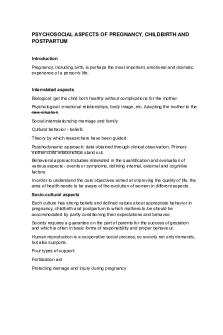
Psychosocial Aspects OF Pregnancy
- 19 Pages
Popular Institutions
- Tinajero National High School - Annex
- Politeknik Caltex Riau
- Yokohama City University
- SGT University
- University of Al-Qadisiyah
- Divine Word College of Vigan
- Techniek College Rotterdam
- Universidade de Santiago
- Universiti Teknologi MARA Cawangan Johor Kampus Pasir Gudang
- Poltekkes Kemenkes Yogyakarta
- Baguio City National High School
- Colegio san marcos
- preparatoria uno
- Centro de Bachillerato Tecnológico Industrial y de Servicios No. 107
- Dalian Maritime University
- Quang Trung Secondary School
- Colegio Tecnológico en Informática
- Corporación Regional de Educación Superior
- Grupo CEDVA
- Dar Al Uloom University
- Centro de Estudios Preuniversitarios de la Universidad Nacional de Ingeniería
- 上智大学
- Aakash International School, Nuna Majara
- San Felipe Neri Catholic School
- Kang Chiao International School - New Taipei City
- Misamis Occidental National High School
- Institución Educativa Escuela Normal Juan Ladrilleros
- Kolehiyo ng Pantukan
- Batanes State College
- Instituto Continental
- Sekolah Menengah Kejuruan Kesehatan Kaltara (Tarakan)
- Colegio de La Inmaculada Concepcion - Cebu
